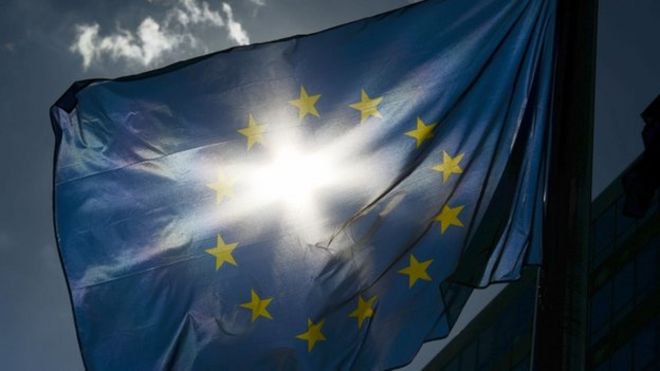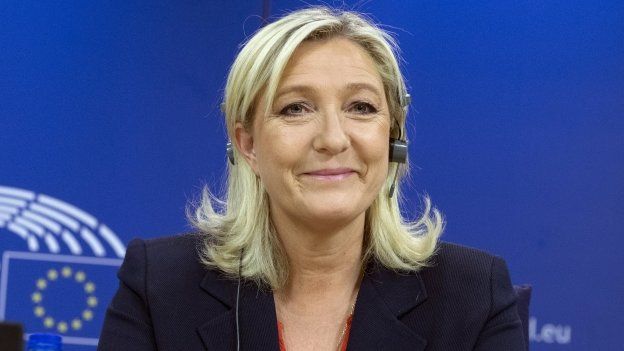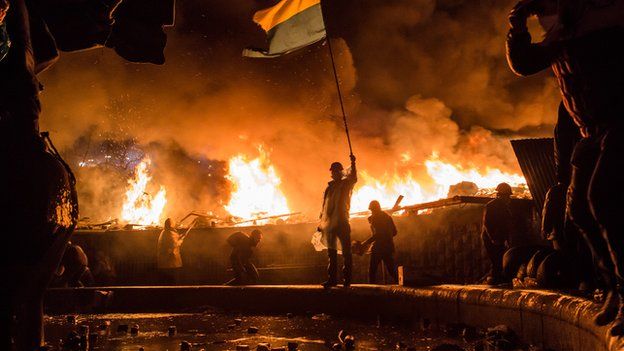Could the EU fall apart completely?
Could the EU fall apart completely?
- 18 June 2015
- Europe

The European prime ministers and presidents who gather in Brussels next Thursday will face two separate crises.
Simple, eh? But their plight is a lot more serious than that.
The twin problems, the apparent climax of the long-running Greek drama, and Mr Cameron's curtain-raiser to UK renegotiation, disguise the depth of the real problem.
The tortuous detail, the twists and turns to these two stories tend to obscure the fact that they are the symptoms, not the disease.
The two possibilities are linked by an overarching crisis, both less dramatic and far more serious.
Looming in the background, meet - EUex.
Not "ex" for exit, but for existential crisis - in both the philosophical sense of purpose and meaning, and the more literal definition - that its very existence is at stake.
These triple challenges might lead to fracture and fragmentation - or Eurofrag, if you prefer.
You might think that is good or bad. It is certainly important.
Heading backwards
In my years as the BBC's Europe editor, from 2005 to 2009, there was plenty of debate about the future of the European Union, but I never took seriously the idea that it might one day cease to exist. That no longer seems so fanciful.
The founding father of the European Union, Jean Monnet, used to say: "Europe will be forged in crises, and will be the sum of the solutions adopted for those crises."
The equation these days rather points towards subtraction, and the crisis could drive Mr Monet's project backwards.

How these traumas are treated over the next few years will define what the EU becomes.
It is just possible it will be on a terminal path to decay and disintegration.
You may cheer, or you may mourn, but you cannot argue that it would be anything other than hugely consequential for the whole continent.
The strains that threaten to tear the EU apart can be summed up by the three nations that stand for different facets of the challenge - Greece, the UK and Ukraine.
The clash between the implacable Greek government and the immovable forces of the International Monetary Fund (IMF) and the European Commission seems to be reaching an increasingly bad-tempered climax.
A Greece euro exit might lead to it leaving the EU, according to the Greek central bank.
Anything that might be hailed as a solution is unlikely to deal with the fundamental problem.
So instability and the dark cloud of exit will continue to hang over the continent.
The Euro project put the political cart firmly ahead of the horse, trundling along, dragging a few rather fine stallions, harnessed to assorted cart horses and the occasional donkey behind it.
Maintaining a steady pace appears impossible, uncoupling the ill-suited nags unpalatable, for while the EU is not the same as the Euro, the single currency is an expression of its pride, ambition, and aspirations.
If countries start talking about flaking off, it makes the whole business look, well, flaky. EUfrag, indeed.
Then there is the UK.
If the UK goes, it would blow a hole in the EU, undermining its credibility around the world.
Behind the need for renegotiation is the public mood.
Once thought of as a British eccentricity, Euroscepticism is now a force across the continent.

If the National Front's leader, Marine Le Pen, wins the French presidential elections in 2016, she will take France out of the European Union.
If British exit would leave the foundations a little shaky, removing the French cornerstone would surely lead to collapse.
But the electoral politics is just an expression of a public mood, a lack of even a little love for the EU.
It has failed is to persuade people it has a positive purpose that makes their lives better.
Inertia and an unloved status quo is a shaky foundation for any political organisation.

Ukraine and its bloody civil war raise the question of the EU's reach and purpose.
"What is the European Union for?" used to be a cosy fireside, post-prandial debate over good brandy for the cognoscenti.
Now, it is more like the tortured cry of an adolescent questioning if life has any meaning.
Eurovision may throw its arms wide to Australia and Israel, but the European Union is uncertain whether it is an idea or a geographical expression.
Eastern expansion
There is little doubt the expansion into the former Soviet bloc has given it indigestion.
Like a goat still clearly defined in the stomach of a snake, the former Communist countries are taking a while to absorb.
But the Western nations could not allow a project forged in the heat of World War Two to be contained by boundaries set in place by that conflict.
As with the euro, a romantic vision of what should be drove the politics.
Serbia and a few others are waiting dutifully in line for now, but the influence of the rouble is growing stronger in the Balkans.
Turkey has already been rebuffed partly on grounds of religion and culture.
Iceland is distinguished by becoming the first nation to change its mind and say: "No thanks," to membership.

European Union expansion:
- Official candidates: Albania, Macedonia, Montenegro, Serbia, Turkey
- Potential candidates: Bosnia-Hercegovina, Kosovo
- Expressed interest: Moldova, Ukraine and Georgia (all signed agreements deepening trade and political links with the EU)

The financial crisis and the lack of self-confidence may be demagnetising the EU.
Immediate survival
None of the above is about either inevitability or desirability.
But one gets the feeling Europe's leader are blundering through a storm, more worried about immediate survival than eventual destination.
Some have a strong enough teleological faith in the project that nothing will shake their belief that it has a destiny and a future.
Others will observe that it has proved pretty robust so far and talk of collapse is pretty hysterical.
Some would dismiss this all as irrelevant flim-flam and worry instead about their own nation's concerns.
But this is a crossroads. And whether politicians want to hasten the process or halt it, they should be thinking about what lies further up the road.
Whatever happens to the European Union, Europe itself will remain.
This is about the future of a continent, and what happens if a noble, flawed vision crumbles

Comments